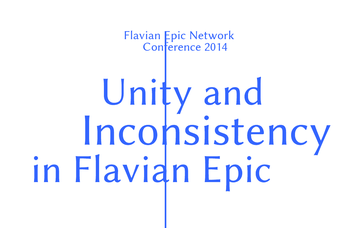Unity and Inconsistency in Flavian Epic

2014. szeptember 04. - 2014. szeptember 05.
MÚK 4/B 217
2014. szeptember 04. - 2014. szeptember 05.
MÚK 4/B 217
International conference of the Flavian Epic Network at Eötvös Loránd University (ELTE),
Budapest, 4–5 September 2014
Unity has been an important principle of aesthetics and literary criticism from Plato, Aristotle and Horace in antiquity (and especially in their 18—19th c. reception) to theoretical movements like Russian formalism and New Criticism in the 20th century. Although some post-structuralist theories have questioned it, and although epic as a genre always, to some extent, resisted it, insistence on the aesthetic integrity and coherence of any literary text has influenced – and continues to influence – most activities of classical philologists from textual criticism to literary interpretation and constructing the canons of Greek and Roman literary history.
Flavian epics have often been criticized, among other reasons, precisely for not being simplex et unum: for their lack of perfect coherence and their apparent episodic character. The "Flavian revival" has brought with it a greater sensitivity for inconsistency as an aesthetic phenomenon as well, and led to re-interpretations of individual passages, but no general study has been published about the subject. James O'Hara's recent investigation of Inconsistency in Roman epic (2006), however, is doubly interesting from our point of view: first, because it shows the presence of inconsistency as a poetic strategy in the Roman epic tradition which the Flavian epics joined; and second, because it stops with a short chapter on Lucan. The aim of our conference is, then, to continue this work and discuss issues of unity and inconsistency in the field of Flavian epic.
Organizers: Attila Ferenczi, Dániel Kozák
PROGRAM
(all sessions in room B/217)
The conference program in pdf is available here.
| 4 September | |
| 9.30—9.45 | Opening the conference |
| 9.45—10.45 |
Andrew Zissos (University of California, Irvine):
Theorizing Inconsistency in Flavian Epic
|
| Coffee break | |
| Chair: Péter Agócs | |
| 11.00—11.35 |
Ruth Parkes (University of Wales Trinity Saint David):
Stars and darkness: inconsistency and unity in Statius’ Thebaid
|
| 11.35—12.10 |
Jean-Michel Hulls (Dulwich College, London):
Take the power back: Genre and gender domination in Statius’ Thebaid
|
| Lunch | |
| Chair: Helen Lovatt | |
| 14.00—14.35 |
Jessica Blum (Yale University, New Haven):
Juno Audax: Rethinking Genre in the Argonautica
|
| 14.35—15.10 |
Emma Buckley (University of St. Andrews):
Phineus and the anger of (un)just Jove: Inconsistency and Interpretation in Valerius
Flaccus’ Argonautica
|
| 15.10—15.45 |
Dániel Kozák (Eötvös Loránd University, Budapest):
Geography and Narrative: (Not) Crossing the Ebro in Silius’ Punica
|
| Coffee break | |
| Chair: Ruth Parkes | |
| 16.15—16.50 |
Helen Lovatt (University of Nottingham):
Suppressing Apollonius in Valerius Flaccus? The election scene
|
| 16.50—17.25 |
Antonio Río Torres Murciano (Universidad Nacional Autónoma de México):
Variations on Sarpedon: Flavian Responses to Virgilian Inconsistency
|
| 17.25—18.00 |
Antony Augoustakis (University of Illinois, Urbana):
Dreaming Inconsistency: Ismene in Thebaid 8
|
| 5 September | |
| Chair: Andrew Zissos | |
| 10.00—10.35 |
Attila Ferenczi (Eötvös Loránd University, Budapest):
The Broken Hero in Valerius Flaccus’ Argonautica
|
| 10.35—11.10 |
Cecilia Criado (University of Santiago de Compostela):
The inconsistency inherent to epic Zeus/Jupiter
|
| 11.10—11.45 |
Claire Stocks (Radboud University, Nijmegen):
The Flavian Medea: Rewriting the Greek World in Valerius’ Argonautica
|
| Lunch | |
| Chair: Attila Ferenczi | |
| 13.30—14.05 |
Robert Simms (Chuo University, Tokyo):
The Prologues of Euripides’ Phoinissae and Statius’ Thebaid
|
| 14.05—14.40 |
Anke Walter (University of Rostock):
Regulus and the inconsistencies of fame
|
| Coffee break | |
| Chair: Attila Ferenczi | |
| 14.40—15.15 |
Susanne Borowski (University of Amsterdam):
The fictional amazon Asbyte as a structural element in Silius Italicus’ historical epic Punica
|
| 15.15—15.50 |
Pieter van den Broek (University of Amsterdam):
The Linus and Coroebus Episode: A Mirror-Text?
|

